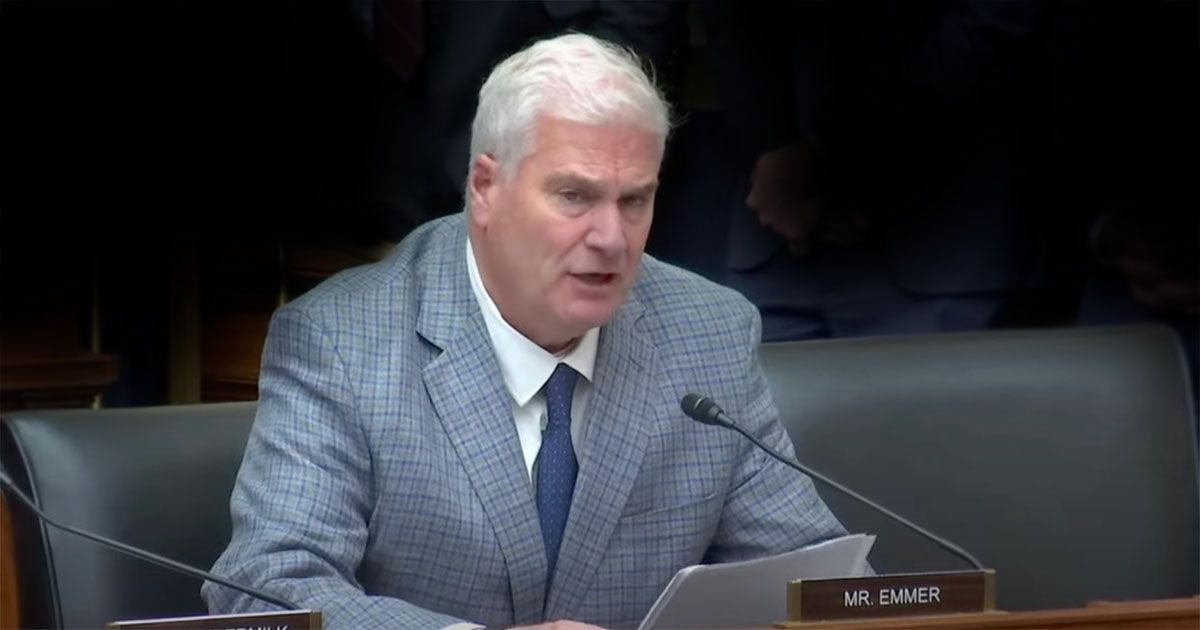Privacy, Freedom, and the Future of American Currency
Exploring the risks of Central Bank Digital Currencies (CBDCs): How they might infringe on financial privacy, freedom, and disrupt traditional banking, with insights from Rep. Tom Emmer.

In a move that underscores the growing concerns surrounding Central Bank Digital Currencies (CBDCs), the Financial Services Committee of the U.S. House of Representatives moved forward a bill aimed at preventing the development and implementation of a CBDC that could spy on Americans and disrupte retail banking and free markets.
The bill's passage signals a growing apprehension about the potential risks CBDCs pose to financial privacy and individual freedoms. Once key is that a CBDC, while digital, is centralized or the opposite of a cryptocurrency like Bitcoin. While Bitcoin is essentially anonymous, the CBDC would track every financial transaction by every person using it.
Rep. Tom Emmer's Stance on CBDCs
Addressing the House Financial Services Committee, Rep. Tom Emmer voiced his concerns about the implications of introducing a CBDC in the U.S. He emphasized, "A central bank digital currency is government-controlled programmable money that, if not designed to emulate cash, could give the federal government the ability to surveil and restrict Americans' transactions."
Rep. Emmer further highlighted that the debate over CBDCs isn't merely an academic or technological one. Instead, it touches upon the very core of American values, particularly the right to privacy and the freedom to transact without undue government oversight. He argued that while the promise of CBDCs might seem alluring to some, the potential risks they pose to the American way of life cannot be ignored.
Privacy and Financial Freedom Threatened
It's clear that the potential risks a central bank digital currency poses to privacy and freedom are significant. As the U.S. grapples with the future of its financial system, the core values that define the nation will play a crucial role in shaping the path forward.
Here are some things to consider.
Financial Privacy
- Existing Protections. The U.S. Constitution enshrines the right to privacy, but over the years, this right, especially in the financial realm, has been eroded. Various laws aimed at countering terrorism, deterring money laundering, and aiding tax collection have expanded the government's surveillance capabilities.
- CBDCs and Privacy. A CBDC, by its very design, would provide the federal government with unprecedented visibility into every financial transaction. This direct link between the government and individual financial activity would eliminate the current buffer provided by various commercial banks and payment services. Such a system could represent the most significant threat to financial privacy in decades.
Financial Freedom
- Control Over Transactions. With a CBDC, the government would have the ability to control, limit, or even prohibit certain financial transactions. The programmable nature of CBDCs means that they could be set to restrict spending on specific goods or services or even alert authorities about certain types of expenses.
- Potential for Abuse. While some proponents argue that CBDCs could be used to promote positive behaviors (e.g., preventing children from buying sweets), the potential for misuse is significant. Governments could use CBDCs to curb behaviors they deem undesirable, such as limiting alcohol purchases or flagging travel expenses during lockdowns. Such controls, even if well-intentioned, could lead to significant abuses of power.
- Threat to Alternatives. CBDCs also pose a threat to private cryptocurrencies, which have emerged as alternatives to traditional banking systems. Countries introducing CBDCs have shown tendencies to clamp down on cryptocurrencies, further consolidating their control over national currencies.
Let's end with a couple more quotes from Majority Whip Emmer.
"In China, the Communist Party is using a central bank digital currency to track the spending habits of its citizens. The data is being used to create a social credit system that rewards or punishes people based on their behavior."
"Closer to home in the Western Hemisphere, in Canada, the Trudeau Administration froze the bank accounts of individuals involved in the 2022 trucker protests. That might work in Canada, that doesn’t work here."
"This appetite for financial surveillance may be gaining a stronghold, unfortunately, right here at home. The White House issued an Executive Order placing urgency on central bank digital currency research and development, and the agency reports to that executive order have made it clear that the Biden Administration is not only itching to create a CBDC, but they are willing to trade American’s right to financial privacy for a surveillance-style central bank digital currency."
